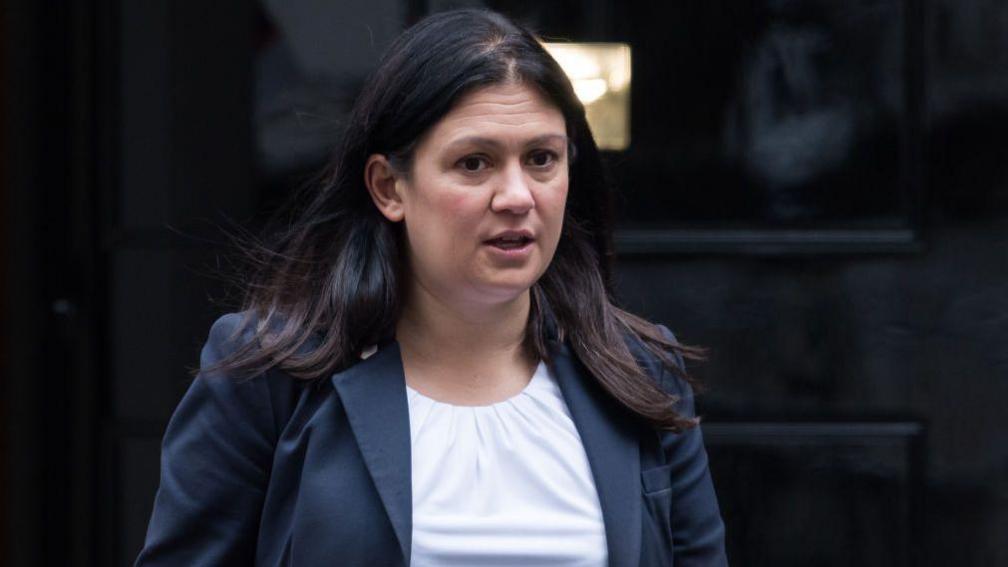Opposition want to bury regulator bill - Nandy

Culture Secretary Lisa Nandy has vowed to pass a Football Governance Bill
- Published
Culture Secretary Lisa Nandy says some opposition members of the House of Lords are "intent on wrecking" the Football Governance Bill by having it delayed "for years to come".
The legislation, which will establish the first independent regulator for the professional men's game in England, was reintroduced to Parliament by the government in October.
It has just completed the first 'committee stage' in the Lords, where hundreds of potential amendments were tabled.
The government is concerned that the legislation could be reclassified as a 'hybrid bill', which would require additional consultation with clubs.
"We really are at a critical juncture here," said Nandy, speaking at an event organised by the All-Party Parliamentary Group on Football and the English Football League (EFL).
"We've had what is known as a 'wrecking amendment' put in front of the House of Lords in recent weeks to turn this bill into a hybrid bill, which would bury it in committee for years and years to come.
"And I do want to say to that handful of peers that have decided to take that approach, 'what you are doing is killing off the hopes and dreams and inheritance of fans who deserve far, far better'."
A hybrid bill is one that is deemed to target specific private interests - such as football clubs. It must allow those affected to submit a petition to Parliament outlining their opposition, potentially adding to the time needed for it to pass into legislation.
Conservative peers have denied claims they are trying to delay the bill, insisting they are subjecting it to proper scrutiny.
Football regulator to have power to tackle parachute payments
- Published23 October 2024
Government reintroduces football regulator bill
- Published17 July 2024
Background to Football Governance Bill
The landmark legislation was tabled initially in March by the previous Conservative government, but failed to pass through Parliament before the general election was called in May.
The reintroduced version will give the regulator powers to assess the impact of the Premier League's controversial 'parachute payments' to relegated clubs as part of a 'State of the Game' review every five years.
Its findings could influence which proposed sharing model the regulator may then impose - the Premier League's or the EFL's - if it is asked to decide how much money the top flight should redistribute to the football pyramid via 'backstop powers'.
It will also "explicitly require clubs to provide effective engagement" with fans on changes to ticket prices and any proposals to relocate home grounds.
However, while supporter groups and the EFL are among those to have welcomed the bill, the Premier League is concerned at the regulator having "unprecedented and untested powers to intervene in the distribution of [its] revenues", and also said it could have "a negative impact" on competitiveness and investment.
The legislation has also faced opposition from peers such as West Ham United vice chair Baroness Brady, who told the Lords that there are "dangers lurking in this bill".
Other members of the Lords have expressed concerns over the potential cost to smaller clubs, although the government said there was no intention to "impose unnecessary, onerous and burdensome requirements" on clubs, which was "in no-one's interest".
'Hard but important message'
Last month Nandy told MPs it was "high time we got on with it" when asked about the scrutiny the legislation had faced in the House of Lords. She has now delivered what she called "a hard but important message".
"It was a Labour opposition and the Conservative government that put the commitment to continue with these reforms into our manifestos, and it was the British people who voted for them," she said.
"And my message to those handful of Conservative peers is: 'We will not rest until we make good on that promise to fans'.
"This is what people voted for - this is nothing less than fans deserve, and we are a government that will leave no stone unturned to deliver on that promise. Change for fans has been long overdue, that change is coming, and nobody will stand in its way."
The bill will now pass to the 'report stage' of its journey through the House of Lords before it passes to the Commons. The government hopes it will come into law later this year.
Related topics
- Published16 August
